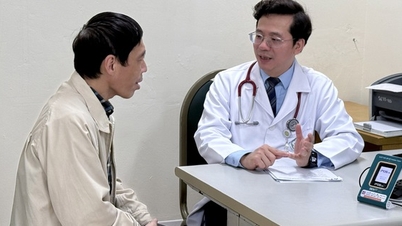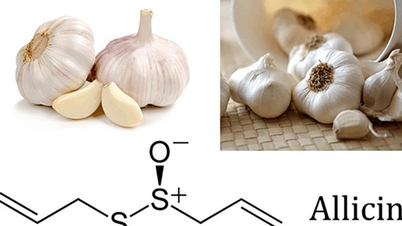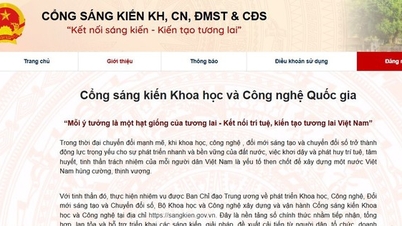NDO - If infected with seasonal flu, people with underlying diseases such as cardiovascular and respiratory diseases will face many risks of serious complications such as pneumonia, acute decompensated heart failure in patients with heart failure, increased risk of arrhythmia in cardiovascular patients; myocarditis...
Complications that can occur in people with underlying cardiovascular disease when they have the flu
The weather in the North is turning cold and is predicted to continue to change to humid conditions. In the context of the increasing number of people with seasonal flu, the weather is a favorable condition for the number of people with the disease to increase, especially patients with underlying diseases such as cardiovascular and respiratory diseases...
Associate Professor, Dr. Nguyen Thi Thu Hoai, Director of the National Heart Institute, Bach Mai Hospital, said that seasonal flu can aggravate symptoms in heart failure patients and increase the risk of cardiovascular complications in both healthy people and patients with underlying cardiovascular disease.
Seasonal flu can cause fever, dehydration and increased oxygen demand when infected with flu, causing the heart to work harder, easily leading to acute decompensated heart failure in patients with heart failure, increasing the risk of arrhythmia in cardiovascular patients. In addition, patients with high blood pressure or heart failure are often prescribed vasodilators and diuretics by doctors, when infected with flu, patients can become dehydrated and have vasodilation due to fever, so it is necessary to consult a cardiologist immediately to adjust these medications.
Seasonal flu can also increase the risk of cardiovascular complications in both healthy people and especially patients with underlying cardiovascular disease. In some cases, seasonal flu can lead to acute myocarditis, causing acute arrhythmias, rapidly progressing acute heart failure, the disease will be more dangerous in patients with chronic cardiovascular disease.
Furthermore, seasonal flu often causes systemic inflammatory reactions, increasing the risk of blood clotting disorders, which will increase the risk of myocardial infarction and stroke in patients with atherosclerotic cardiovascular disease.
Three issues to note for people with cardiovascular disease
There are three main issues that patients need to pay attention to: medication regimen, lifestyle and diet.
Regarding medication regimen, Dr. Hoai noted that it is necessary to maintain cardiovascular medication: Take the correct dose, do not stop on your own (including blood pressure medication, anticoagulants, statins). Most importantly, patients need to understand what medications they are taking and what their main effects are in order to monitor them appropriately.
Some drugs commonly used to treat flu symptoms such as pain relievers and fever reducers, especially NSAIDs (ibuprofen...) or corticosteroids can worsen symptoms of heart failure and high blood pressure, so you should consult a cardiologist and infectious disease specialist before using them.
Flu can cause high fever, strong vasodilation and dehydration, so if cardiovascular patients are taking vasodilators or diuretics, they need to be closely monitored and the cardiologist managing the treatment should be notified for timely adjustment.
In terms of daily activities, flu vaccination is important for cardiovascular patients. Vaccination helps reduce the risk of flu and the severity of flu progression, which is very important for cardiovascular patients, especially those with congestive heart failure. In addition, it is important to wear a mask, wash your hands, avoid crowded places; get enough sleep 7-8 hours/day, and avoid strenuous exercise.
Regarding diet, people with cardiovascular disease need to strengthen their immunity by supplementing vitamin C (oranges, guava), zinc (seeds, meat), garlic; maintain fluid balance by drinking enough water (1.5-2 liters/day); control blood pressure by eating a low-salt diet, limiting animal fat, and increasing green vegetables and fish.
If you have the flu, people with cardiovascular disease need to follow the treatment regimen of the infectious disease doctor, consult the cardiologist who is managing the treatment about the cardiovascular regimen being used to see if cardiovascular medication needs to be adjusted or not. It is important to pay attention to re-examining the cardiovascular system immediately if you have the following symptoms: Prolonged rapid heartbeat, difficulty breathing, chest pain, leg swelling...
"Patients with cardiovascular disease should get the flu vaccine every year. This has been clearly recommended by prestigious cardiovascular associations such as the American Heart Association, the European Heart Association, and the Vietnam Heart Association: The flu vaccine reduces the risk of cardiovascular events by 15-45%. We recommend vaccination for all cardiovascular patients, including those with heart failure or after coronary intervention, patients with hypertension, heart valve disease, and cardiomyopathy," said Dr. Hoai.
Note, people with cardiovascular disease need to see a cardiologist before getting vaccinated to ensure their cardiovascular condition and blood pressure are being treated stably. In particular, do not get vaccinated if blood pressure is too high or too low or if the patient has a cardiovascular emergency or decompensated heart failure. Inactivated vaccines should be given to ensure safety and avoid live attenuated vaccines.
Source: https://nhandan.vn/cum-mua-lam-tang-nguy-co-cac-bien-chung-tim-mach-post859843.html


![[Photo] Panorama of the 2025 Community Action Awards Final Round](https://vphoto.vietnam.vn/thumb/1200x675/vietnam/resource/IMAGE/2025/11/15/1763206932975_chi-7868-jpg.webp)
![[Photo] General Secretary To Lam receives Vice President of Luxshare-ICT Group (China)](https://vphoto.vietnam.vn/thumb/1200x675/vietnam/resource/IMAGE/2025/11/15/1763211137119_a1-bnd-7809-8939-jpg.webp)



![[Photo] Prime Minister Pham Minh Chinh meets with representatives of outstanding teachers](https://vphoto.vietnam.vn/thumb/1200x675/vietnam/resource/IMAGE/2025/11/15/1763215934276_dsc-0578-jpg.webp)

















![[Photo] Prime Minister Pham Minh Chinh meets with representatives of outstanding teachers](https://vphoto.vietnam.vn/thumb/402x226/vietnam/resource/IMAGE/2025/11/15/1763215934276_dsc-0578-jpg.webp)










































































Comment (0)